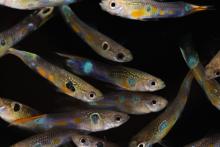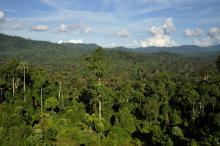A UBC professor of Chemistry who studies how enzymes function, engineers them for use in industrial applications, and develops inhibitors as potential therapeutics has been elected to the Royal Society.
Stephen Withers, Director of UBC's Centre for High-Throughput Biology, was elected to the United Kingdom’s prestigious independent national academy on April 20.
"Science impacts on most aspects of modern life, improving our understanding of the world and playing an increasing role as we grapple with problems such as feeding a growing global population and keeping an aging home population healthy," says Sir Paul Nurse, President of the Royal Society.
"These scientists who have been elected to the Fellowship of the Royal Society are among the world’s finest. They follow in the footsteps of luminaries such as Newton, Darwin and Einstein and I am delighted to welcome them into our ranks."
Using a wide range of techniques, Withers' fundamental studies have elucidated the chemical mechanisms of several new enzyme classes and deeply characterized mechanisms of others.
On the applied side, Withers is developing directed evolution approaches to engineer enzymes for the efficient synthesis of glycoconjugates. High-throughput screens developed by his laboratory allow more than a million transformed bacteria to be scanned per hour. Enzymes identified by Withers' team have been licensed by industry for commercial syntheses.
Another area of interest is in the discovery of enzyme inhibitors as novel pharmaceuticals through design and high-throughput screening--his recent work has identified potential treatments for diabetes, influenza and Tay Sachs disease.
The Royal Society is a self-governing Fellowship of many of the world’s most distinguished scientists drawn from science, engineering and medicine. It recognizes, promotes and supports excellence in science and to encourage the development and use of science for the benefit of humanity.
Eleven UBC Science researchers have been elected to the Society.
Musqueam First Nation land acknowledegement
We honour xwməθkwəy̓ əm (Musqueam) on whose ancestral, unceded territory UBC Vancouver is situated. UBC Science is committed to building meaningful relationships with Indigenous peoples so we can advance Reconciliation and ensure traditional ways of knowing enrich our teaching and research.
Learn more: Musqueam First Nation
Faculty of Science
Office of the Dean, Earth Sciences Building2178–2207 Main Mall
Vancouver, BC Canada
V6T 1Z4


